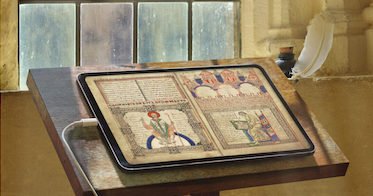LECTURE SERIES
ONLINE MMMONK SCHOOL, AUTUMN 2023
MMMONK AND HENRI PIRENNE INSTITUTE FOR MEDIEVAL STUDIES (UGENT)
1 December 2023, 4:00-6:00PM CET / 10:00AM-12:00PM ET
Mmmonk and Henri Pirenne Institute for Medieval Studies (UGent) will host the second edition of Mmmonk school in the autumn of 2023. Mmmonk School offers lessons for advanced beginners about the medieval book. It is an interdisciplinary practice-focused programme about medieval Flemish manuscripts. Six experts introduce the main concepts, skills and methods of their given field of expertise. The lessons are online, free and open for everyone.
Lisa Demets (Ghent University), An Introduction to Multilingual Manuscripts in Medieval Flanders, 4-5PM CET
Multilingualism was the norm in the Middle Ages. Traveling from the Scandinavian towns to the Italian city states, language changed gradually from village to village, town to town. Port cities such as Bruges in the Late Middle Ages were vibrant multilingual hubs, facilitating interactions and language exchanges. This raises questions about medieval manuscript culture. Literary language choice and professional language use often overlapped. In this session, we will focus on the contextualization of metadata of Flemish literary manuscripts from 1200 to 1500. What are the dominant factors to analyze multilingualism: language, genre, or social milieu? And what defines a multilingual manuscript? The inclusion of Dutch alongside French or Latin in a multilingual manuscript could indicate both a high or low level of multilingualism: either the book owner read in multiple languages with facility, or the reader’s French or Latin was insufficient to understand the text without instructions in Dutch. And should we include or exclude ‘monolingual’ manuscripts? Can ‘monolingual’ manuscripts hide a polyglot context?
Lisa Demets is a postdoctoral researcher (FWO) at Ghent University. In 2019, she defended her PhD thesis on the manuscript variation of the Excellente Cronike van Vlaenderen. From April 2020 to March 2022, she was stationed as a postdoctoral researcher at Utrecht University on the NWO funded project The Multilingual Dynamics of Medieval Flanders. Her main research interests are manuscripts and their multilingual reading and writing contexts in the late medieval county of Flanders. She has published on gender history, medieval chronicle writing, manuscript studies and the political and cultural history of the late medieval Low Countries.
Jeroen Deploige and Wim Verbaal (Ghent University), ‘Spotlight on Mmmonk Research’: Medieval Reading Strategies - The Liber Floridus as a circular enclosure of creation, history and incarnation, 5-6PM CET
In the most recent issue of the journal Sacris Erudiri (DOI 10.1484/J.SE.5.133569), Jeroen Deploige and Wim Verbaal propose a new understanding of the composition Lambert of Saint-Omer’s famous Liber floridus (completed c. 1121). Their contribution focuses on the significance of the idealized city. To this end, they move from the historical and material reality of Saint-Omer, one of the most dynamic centres of urban development in early twelfth-century Flanders, to the autograph manuscript of the Liber (MS Ghent, University Library, 92). In doing so, they ask to what extent both the city as a general concept, and more specifically the town of Saint-Omer, are present in Lambert’s work of compilation. They argue that the key to answering this question lies in the Liber’s specific structure, more so than in its actual content. This insight requires them to read and approach the codex no longer solely as a linear composition, marked by an associative sequence of topics, chapters and illuminations dealing with salvation history and creation. Lambert’s work emerges as a markedly circular composition, consisting of different concentric layers and constructed around a specific central text. In their Mmmonk-talk, Deploige and Verbaal will elucidate their key insights with the Liber floridus at hand.
Jeroen Deploige is Full Professor of Medieval History, specialised in the cultural history of Northwestern Europe between the tenth and the fifteenth centuries. Besides subjects on the Middle Ages, he also teaches public history, narratology and historical anthropology. He is Head of the UGent History Department.
Wim Verbaal, professor of Latin language and literature, Ghent University, is responsible for the Scientific Research Network Literature without Borders, member of the International Medieval Latin Committee and of editorial committees at Corpus Christianorum, Sacris Erudiri and Toronto Medieval Texts. His research includes Latin poetics and its development within medieval literature. He also publishes on the cosmopolitanism of Latin literature as European literature in medieval and modern times, on the poetics of cosmopolitan literatures, and on the emergence and impact of the classical paradigm on modern Europe. Moreover, he is an active translator from Latin and publishes on the problems of translating from cosmopolitan languages.
Join us on three consecutive Fridays (4-6pm CET) in November and December!
To Register: https://brugge.bibliotheek.be/formulier/mmmonk-school-2023
For More Information: https://www.mmmonk.be/en/news/mmmonk-school-2023-programme-and-registration

